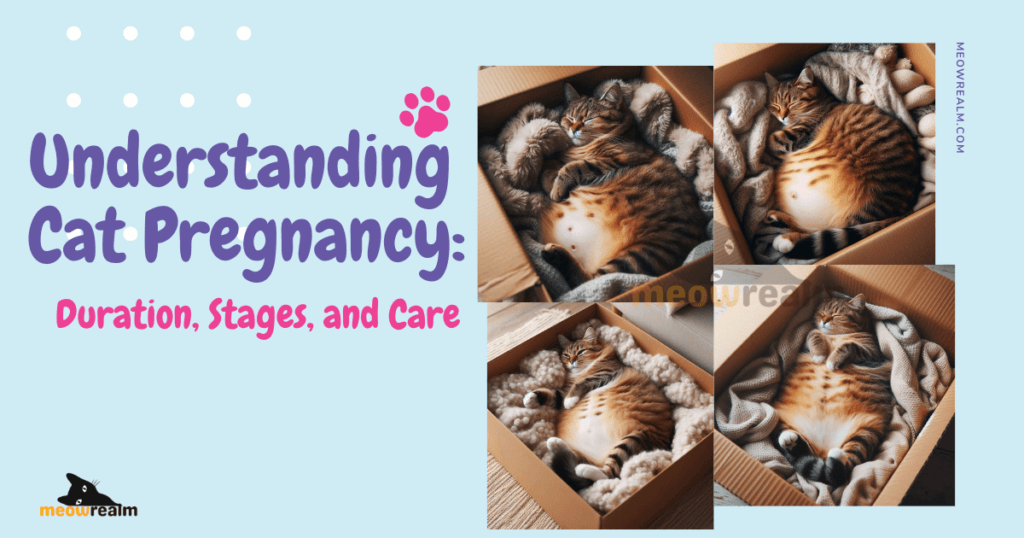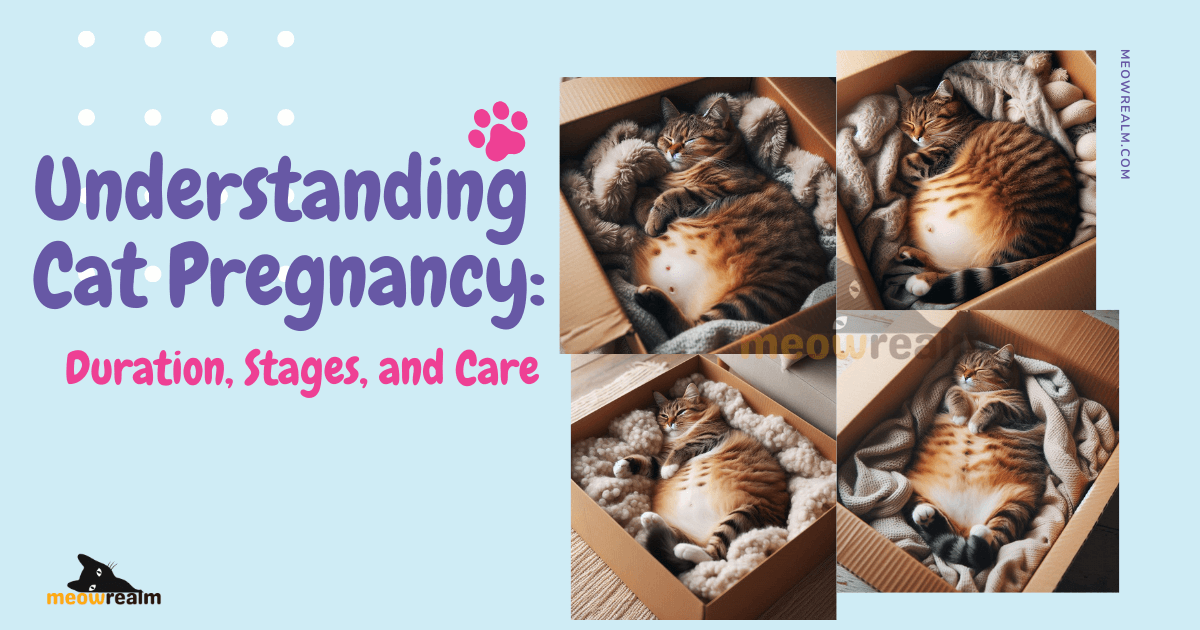The Miracle of Cat Pregnancy
How long are cats pregnant Cat pregnancy is a fascinating journey, lasting around 63 to 65 days on average. If you’ve noticed changes in your feline companion’s behavior, appetite, or nesting habits, she may be expecting! Understanding the cat gestation period is crucial for ensuring a smooth pregnancy and healthy kittens. In this guide, we’ll explore the six key stages of pregnancy, from conception to birth, while addressing common questions like “how do you tell your cat is pregnant?” and “what are the main cat labor signs?”
Table of Contents

2. Stage 1: Fertilization and Early Pregnancy (Days 1–7)
In the first week of pregnancy, fertilization occurs after mating. Unlike humans, cats are induced ovulators, meaning ovulation happens only after mating.
Early Signs of Pregnancy
- Increased affection – Your cat may seek more attention.
- Slight appetite changes – Some cats eat more, while others eat less.
- Minimal physical changes – At this stage, there are no visible signs.
While these symptoms may be subtle, an experienced cat owner may notice behavioral shifts that hint at pregnancy.
3. Stage 2: Embryo Development (Weeks 2–3)
By the second and third weeks, the embryos implant in the uterus, and hormonal changes start affecting the cat’s behavior and body.
What to Expect
- Pinking up – The cat’s nipples turn pinker and slightly enlarged.
- Morning sickness – Some cats experience nausea.
- Mild weight gain – The belly is still not noticeably bigger.
A vet can confirm pregnancy through palpation or an ultrasound, which can detect fetal heartbeats as early as day 16.
4. Stage 3: Mid-Pregnancy Growth (Weeks 4–5)
Now, the pregnancy becomes visibly noticeable, and kittens develop rapidly inside the womb.
Changes in This Stage
- Weight gain – Your cat’s belly begins to expand.
- Increased appetite – She will require more nutrition to support her growing kittens.
- Behavioral changes – She may become more attached or seek isolation.
It’s essential to switch to high-quality kitten food at this stage to provide adequate nutrients.
5. Stage 4: Final Weeks and Nesting Behavior (Weeks 6–7)
As pregnancy advances, your cat will begin preparing for labor by seeking a comfortable, quiet space to give birth.
Signs of the Nesting Phase
- Increased grooming – Particularly around the belly.
- Restlessness – She may pace or move around frequently.
- Nesting behavior – She may drag soft objects to a specific spot.
Creating a warm, quiet nesting area will help her feel safe before labor begins.
6. Stage 5: Pre-Labor Symptoms (Week 8–9)
At this stage, kittens are fully developed, and labor is imminent. Recognizing cat labor signs is vital to ensure a safe delivery.
Signs of Labor Approaching
- Drop in body temperature – A cat’s normal temperature of 101-102.5°F may decrease slightly.
- Loss of appetite – She may stop eating 24 hours before labor.
- Frequent licking – Particularly around the genital area.
- Restlessness and vocalization – Some cats meow more than usual.
If these symptoms appear, be prepared for the kittens to arrive soon!
7. Stage 6: Labor and Birth (Day 63–67) how long are cats pregnant
The final stage marks the moment new kittens enter the world! Cat labor usually consists of three phases:
Three Phases of Labor
- First Stage (6–12 hours): Mild contractions, pacing, and nesting.
- Second Stage (Birth Process): Strong contractions followed by the birth of each kitten (10–60 minutes apart).
- Third Stage (Placenta Delivery): The placenta is expelled after each kitten is born.
Most cats give birth without complications, but if a kitten is stuck for more than an hour, seek immediate vet assistance.
8. After Birth: Caring for the Mother and Kittens how long are cats pregnant
Once the kittens arrive, the mother cat will instinctively clean and nurse them. However, monitoring her for postpartum issues is important.
Post-Birth Care Tips

- Ensure kittens are nursing within the first hour.
- Keep the environment warm and draft-free.
- Monitor the mother for signs of infection or distress.
If the mother rejects a kitten, human intervention may be necessary to bottle-feed and care for the newborn.
9. Conclusion: The Joy of Welcoming New Kittens how long are cats pregnant
Understanding the cat gestation period and cat pregnancy length helps owners provide the best care during this crucial time. From conception to labor, each stage plays a significant role in the birth of healthy, happy kittens. If you suspect your cat is pregnant, early vet checkups, proper nutrition, and a comfortable birthing space can make all the difference.
Welcoming a litter of kittens is a heartwarming experience, and with the right knowledge, you can ensure both the mother and her babies thrive!
Bonus: Frequently Asked Questions
1. How long do cats stay pregnant?
On average, 63–65 days, though some may go into labor as early as 58 days or as late as 70 days.
2. How do you tell your cat is pregnant?
- Enlarged, pink nipples (pinking up)
- Increased appetite and weight gain
- Changes in behavior and nesting tendencies
3. What are the signs of cat labor?
- Loss of appetite
- Restlessness and excessive grooming
- Vocalization and nesting behavior
4. What should I feed my pregnant cat?
Switch to high-protein kitten food for added nutrients.
5. Can I help my cat during labor?
Yes, by providing a calm, quiet space and monitoring for complications.
how long are cats pregnant – Cat pregnancy, also known as gestation, is a fascinating and relatively short process compared to human pregnancy. Understanding the duration, stages, and necessary care during this period is crucial for ensuring the health and well-being of both the mother cat (queen) and her kittens. This article will delve into the specifics of how long cats are pregnant, the stages of pregnancy, and the best practices for caring for a pregnant cat-how long are cats pregnant
Duration of Cat Pregnancy – how long are cats pregnant
The average duration of a cat’s pregnancy is approximately 63 to 65 days, which is roughly nine weeks1. However, this period can vary slightly, ranging from 61 to 72 days2. Factors such as the breed of the cat and the number of kittens in the litter can influence the exact length of the pregnancy. For instance, larger litters may result in a slightly shorter gestation period, while smaller litters might extend it.
Stages of Cat Pregnancy
How long are cats pregnant
Cat pregnancy can be divided into several distinct stages, each characterized by specific physiological and behavioral changes:
- Early Stage (Weeks 1-3) – how long are cats pregnant
- Fertilization and Implantation: After mating, fertilization occurs, and the fertilized eggs travel to the uterus for implantation. During this stage, there are few visible signs of pregnancy.
- Behavioral Changes: Some queens may become more affectionate or, conversely, more solitary.
- Middle Stage (Weeks 4-6) – how long are cats pregnant
- Physical Changes: Around the fourth week, the queen’s abdomen begins to swell as the kittens grow. This is often the first noticeable sign of pregnancy.
- Increased Appetite: The queen’s appetite increases to support the growing kittens.
- Nipple Changes: The nipples become larger and pinker, a phenomenon known as “pinking-up.”
- Late Stage (Weeks 7-9) – how long are cats pregnant
- Nesting Behavior: As the due date approaches, the queen may start seeking out quiet, secluded places to give birth. This nesting behavior is a clear sign that labor is imminent.
- Weight Gain: The queen continues to gain weight, and her abdomen becomes more pronounced.
- Restlessness and Lethargy: The queen may alternate between periods of restlessness and lethargy as she prepares for labor.
Signs of Impending Labor – how long are cats pregnant
As the queen approaches the end of her pregnancy, there are several signs that labor is near:
- Drop in Body Temperature: A slight drop in body temperature (to around 99°F or 37.2°C) can indicate that labor will begin within 24 hours.
- Restlessness and Vocalization: The queen may become restless, pace, and vocalize more than usual.
- Nesting: She will spend more time in her chosen nesting area, arranging bedding and preparing for the birth.
Caring for a Pregnant Cat – how long are cats pregnant
Proper care during pregnancy is essential for the health of both the queen and her kittens. Here are some key considerations:
- Nutrition
- High-Quality Diet: Provide a high-quality, balanced diet formulated for pregnant or nursing cats. Kitten food is often recommended due to its higher calorie and nutrient content.
- Frequent Meals: Offer smaller, more frequent meals to accommodate the queen’s increased nutritional needs.
- Veterinary Care
- Regular Check-Ups: Schedule regular veterinary check-ups to monitor the queen’s health and the development of the kittens.
- Vaccinations and Parasite Control: Ensure the queen is up-to-date on vaccinations and parasite control, as these can affect the health of the kittens.
- Comfort and Safety
- Nesting Area: Provide a quiet, comfortable, and safe nesting area for the queen to give birth. This area should be easily accessible and free from disturbances.
- Minimize Stress: Keep the queen’s environment calm and stress-free. Avoid introducing new pets or making significant changes to her surroundings during this time.
how long are cats pregnant
Understanding the duration and stages of cat pregnancy, along with providing appropriate care, is crucial for ensuring a healthy and successful birth. By recognizing the signs of pregnancy and impending labor, and by offering the necessary support and nutrition, you can help your queen navigate this exciting period with ease. Whether you’re a seasoned cat owner or experiencing your first feline pregnancy, being informed and prepared will make the journey smoother for both you and your furry friend.


